Campaigning for Camden’s LGBTQ+ history and future
History
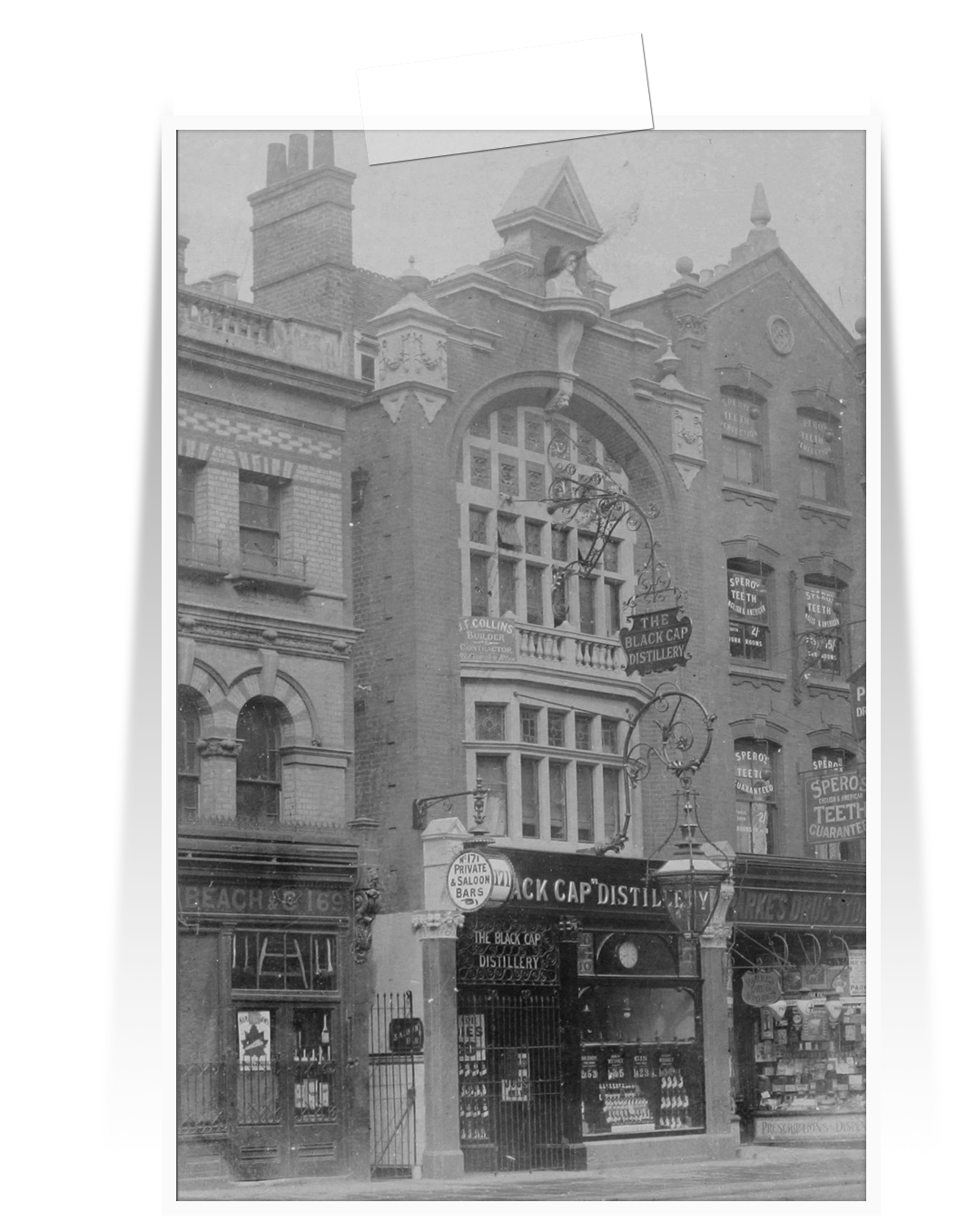
The Cap (as it’s affectionately known) is a historic landmark in Camden Town. It has been a pub for over 250 years and became an important LGBTQ+ venue even before homosexuality began to be decriminalised in 1967. For many decades it’s been famous for its cabaret and drag performances and has launched many artistic careers. The Black Cap has also fostered many community and activist groups and projects and is well known in Camden and beyond as a place of safety, welcome, diversity, and fun.
Before the 1960s
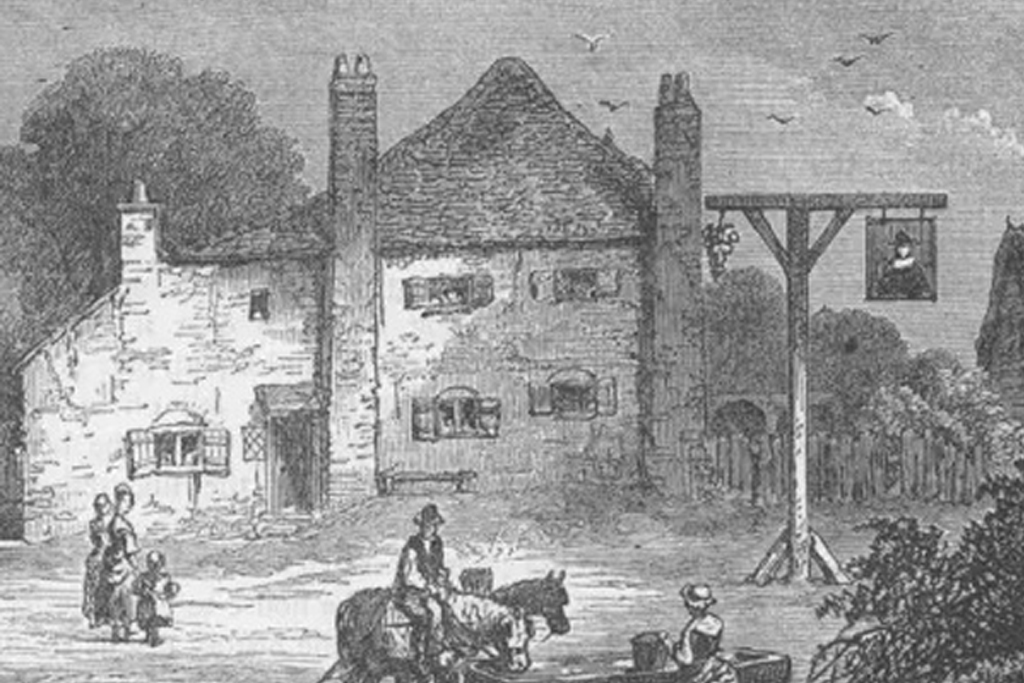
The Mother Red Cap in the 1740s
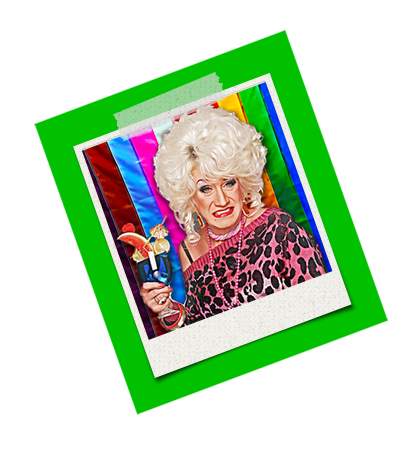
Records of the Mother Black Cap, as it was originally called, go back to 1751, though the pub may have existed much earlier. There are no known pictures of the building from that time but it may have looked something like its ‘sister pub’ the Mother Red Cap (now called the World’s End). The two pubs stood on opposite sides of the road leading north-west from London to Hampstead. In those days there were very few other buildings in the area: the rest of Camden Town grew up around the Black Cap and the Red Cap.
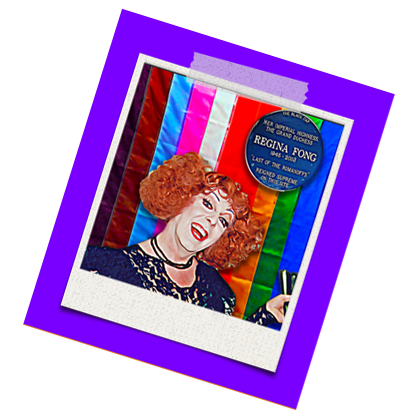
There are two popular stories about the origin of the name ‘the Black Cap’. Some say it was named after a local witch known as Mother Black Cap. Others say it takes its name from the black silk cloth that was traditionally placed on the top of a judge’s wig before he sentenced someone to death. A Victorian tile mural inside the Cap seems to refer to both stories: it shows a witch and several men, some apparently asleep or dead. Outside the window behind them is a gallows with a figure hanging from it.
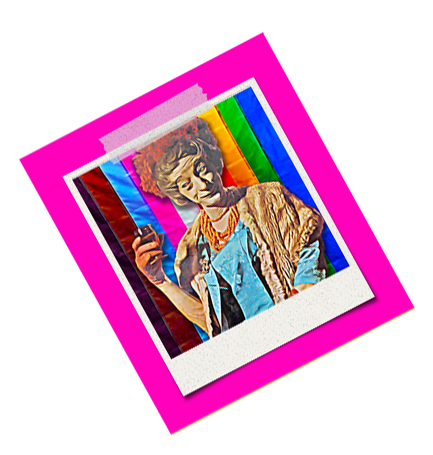
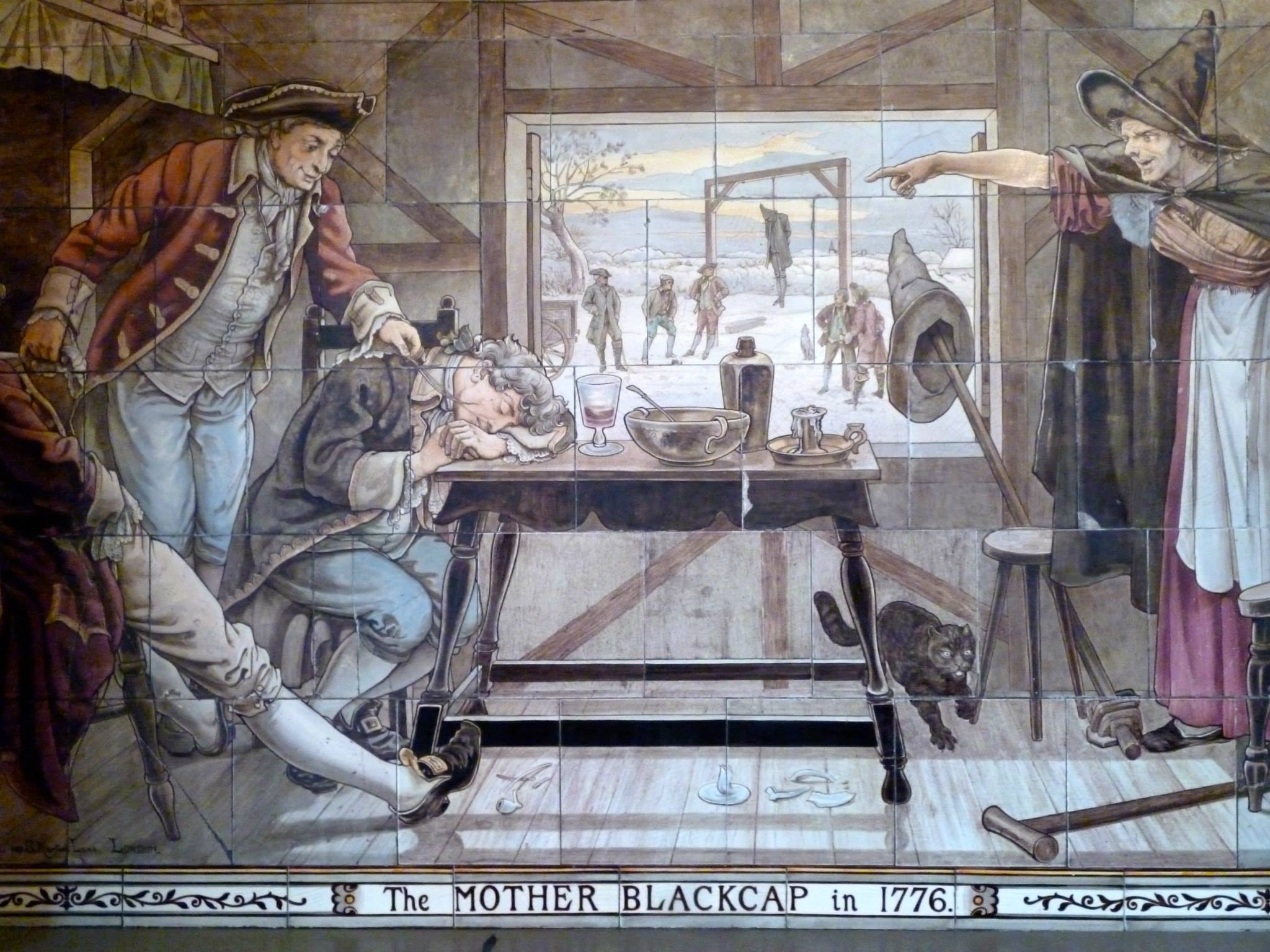
The tile mural titled ‘The Mother Blackcap in 1776’
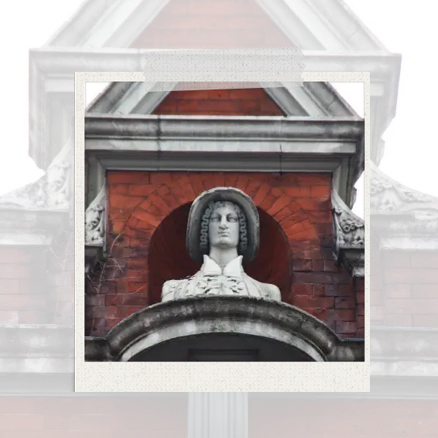
There are in fact records of plans to build a gallows outside the Black Cap in 1776. There are also stories of a local witch named Jinny Bingham who may have been the original Mother Black Cap, as discussed on the Honey & the Hex podcast.
From 1778 to the 1810s the Mother Black Cap was owned by the management of the nearby workhouse, which stood where Camden Town underground station is now. Census records indicate that the name was changed from ‘the Mother Black Cap’ to just ‘the Black Cap’ between 1839 and 1843.
The current building dates from the 1870s or 1880s and features a distinctive gabled facade and large windows in an unusual arched recess. In a nook near the top of the facade is a bust of Mother Black Cap herself, looking rather handsome and serene. But Bram Stoker, author of Dracula, says that the pub also had a painted sign showing a much more ‘fearsome’ portrait of a ‘lady of dark headgear’ with ‘a face typical of all the sins of the Decalogue’.
A photograph of the pub, thought to be from 1904, shows that at that time it was called the Black Cap Distillery. It looks like the front of the building was used as a shop selling bottled drinks, with the back housing several bar rooms where customers could drink on the premises.
It may have been around this time that the Black Cap became known as an Irish pub. The late nineteenth century and early twentieth century saw a rise in the Irish population of Camden Town, partly caused by major building projects. The road junction just outside the Black Cap was nicknamed ‘Paddy’s Corner’ or ‘Penguin Island’ after the groups of Irish workmen who used to gather there in their smart suits before going to work, and the nearby Rowton House (now called Arlington House) provided lodgings for many Irish people including Brendan Behan and Patrick Kavanagh. To this day the Black Cap has a strong Irish connection
Cabaret and drag
Back to buttons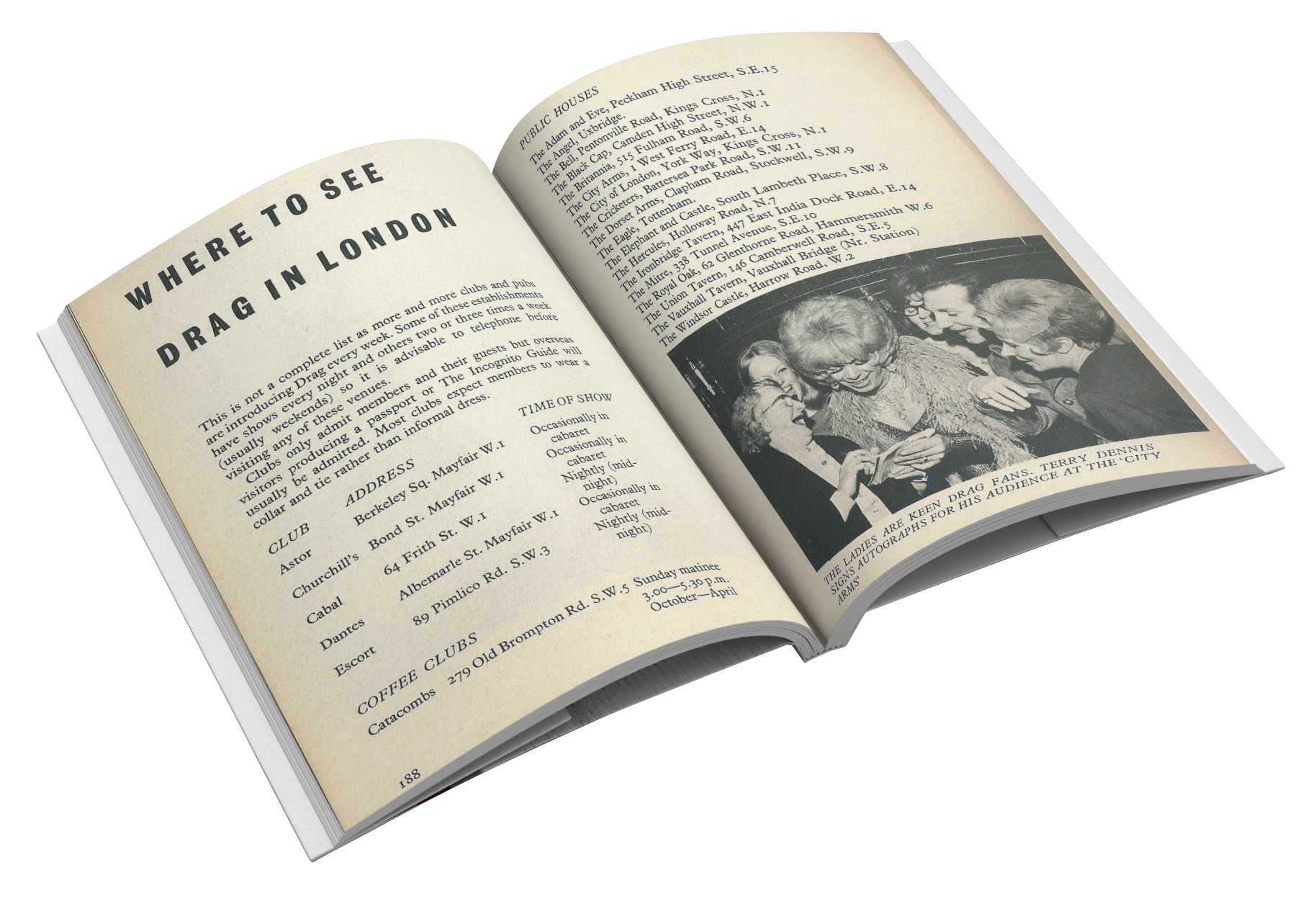
A guide to London drag venues from the late 1960s or early 1970s, listing the Black Cap
In the early / mid-1960s the Black Cap emerged as one of London’s leading gay pubs and drag venues. Performers at the Black Cap in the ’60s and ’70s included Mrs Shufflewick, Danny la Rue, and Hinge & Bracket.
By 1969 the Cap was so big on the London drag scene that a visiting American filmmaker made a short documentary featuring performers Laurie Lee and Shane. In the same year drag queen, Tony Page became the Black Cap’s first permanent compère, serving until 1976.
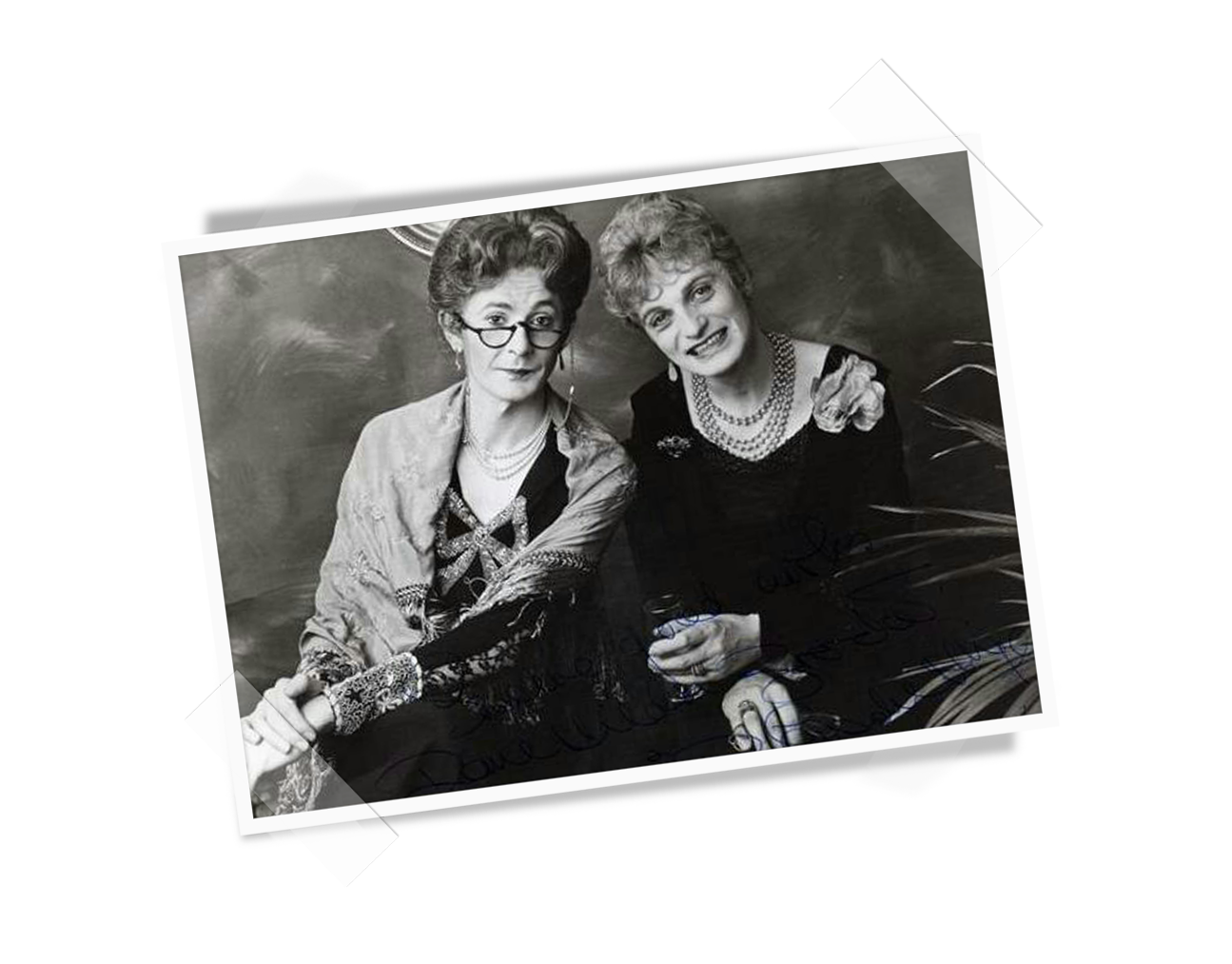
Hinge and Bracket
The Black Cap has always been a crucible for new cabaret talent, with regular open spots, talent nights, and competitions. One performer who made their drag debut at the Cap was Lily Savage, on 7 October 1978. Lily performed at the Cap many times over the years but the reigning queen – or, rather, Grand Duchess – of the Black Cap in the ’80s and ’90s was Regina Fong, ‘last of the Romanoffs’.
A compilation of clips from Regina Fong’s regular Tuesday nights at the Cap
Other great names of the Black Cap stage in the 1980s, ’90s, and 2000s included Sandra, the Trollettes, Adrella, Julian Clary, Titti la Camp, Zsarday, and of course Dave Lynn. Like Lily Savage and so many others, Dave Lynn began at the Cap:
‘I was so nervous it didn’t occur to me to have a name. I got a friend to do the makeup, I borrowed stuff from my mum to wear. The name hadn’t occurred to me. When the host said to me, “what’s your name?” I went “Dave”. That was it.‘
Zsarday’s iconic number ‘I am telling you’ filmed at the Black Cap in 1992
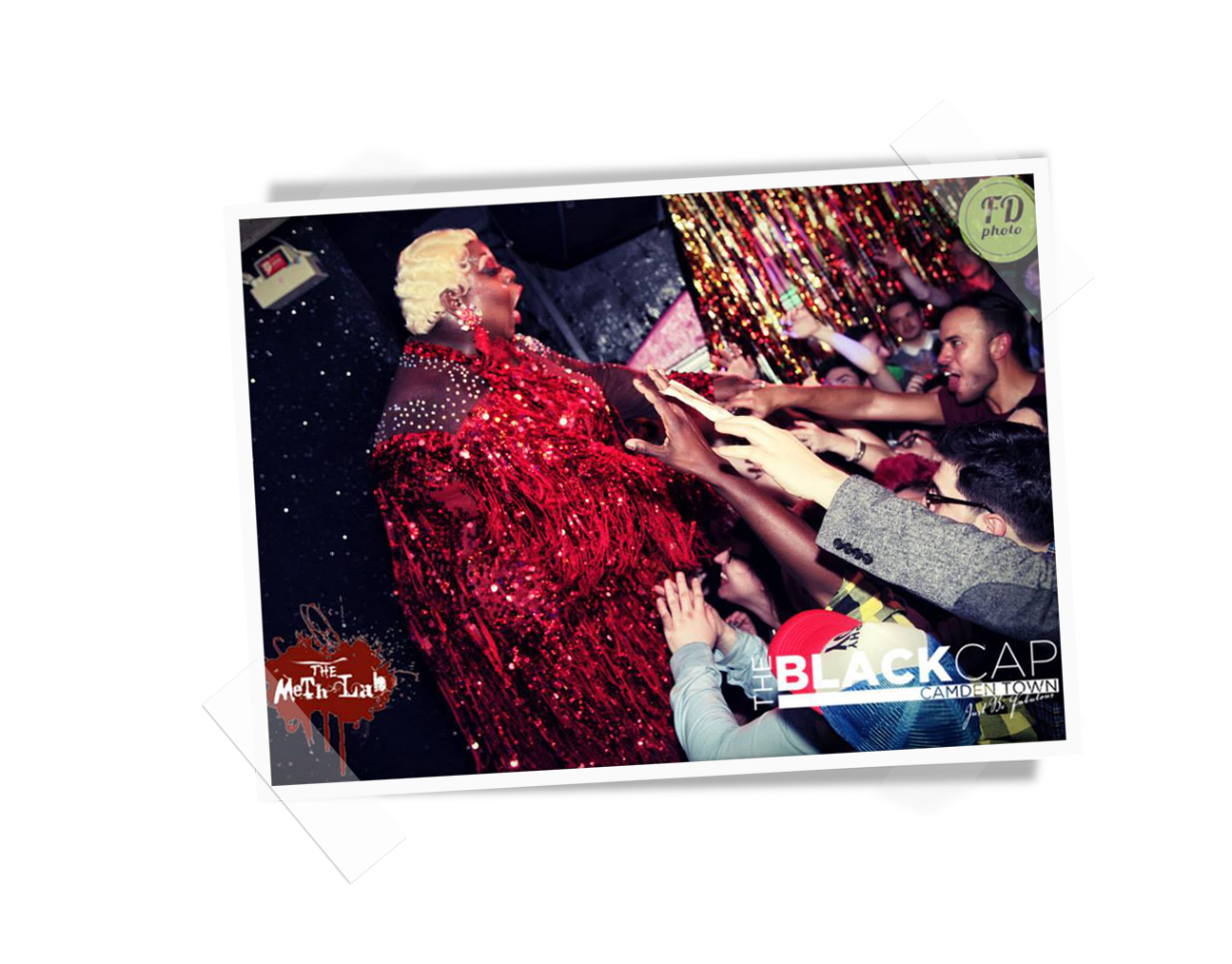
Drag Race star Latrice Royale performing at the Black Cap in January 2015
In addition to drag, the Black Cap hosted a wide range of other entertainment: burlesque (e.g. Coco Deville), clowning (e.g. Dott Cotton), fire-eating and other circus skills (e.g. Aurora Galore, Bambi Blue), singing (e.g. Sadie Sinner), theatre and pantomime (e.g. the Drama Queens), karaoke (e.g. Chris Reardon’s regular karaoke night), live bands (including hosting the Camden Crawl music festival), and of course DJs and dancing late into the night.
The early 2010s brought a new generation of performers (and fans) to the Black Cap including Meth & the Familyyy Fierce, Joe Black, Son Of A Tutu, Adam All, Myra Dubois, the House of Grand Parade, Mary Mac, TeTe Bang, Virgin Xtravaganzah, Marnie Scarlet, Fagulous, and Baga Chipz. These were also the first years of RuPaul’s Drag Race in the States, and when the stars of Drag Race came to the UK, the Black Cap was always their first stop.
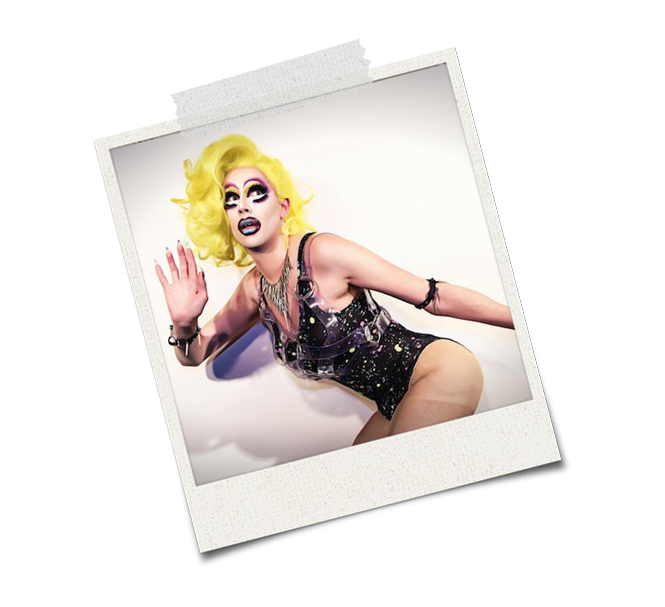
Meth
Safety, community, and activism
Back to buttonsThe Black Cap has always been more than a place of entertainment. In the 1960s, when same-sex intimacy and departing from gender norms were almost inevitably met with hostility and violence, it was a place of safety and joy for LGBTQ+ people from all over London. It’s impossible to guess the number of lives saved by the physical protection and emotional support of the Black Cap. The Cap’s status as a safe haven became so well established that it was something of a refuge for all kinds of people. In the 1970s and 1980s, when Camden Town could be a volatile and dangerous place on a Saturday night, the Cap was known as the safest place on the High Street. Right up until it closed, it was seen by many local women (straight and cis as well as lesbian, bi, and trans) as the one pub or nightclub where they knew they wouldn’t get any hassle, and many Camden residents today remember it as the first pub they visited when they were growing up because it was the place their parents trusted most.
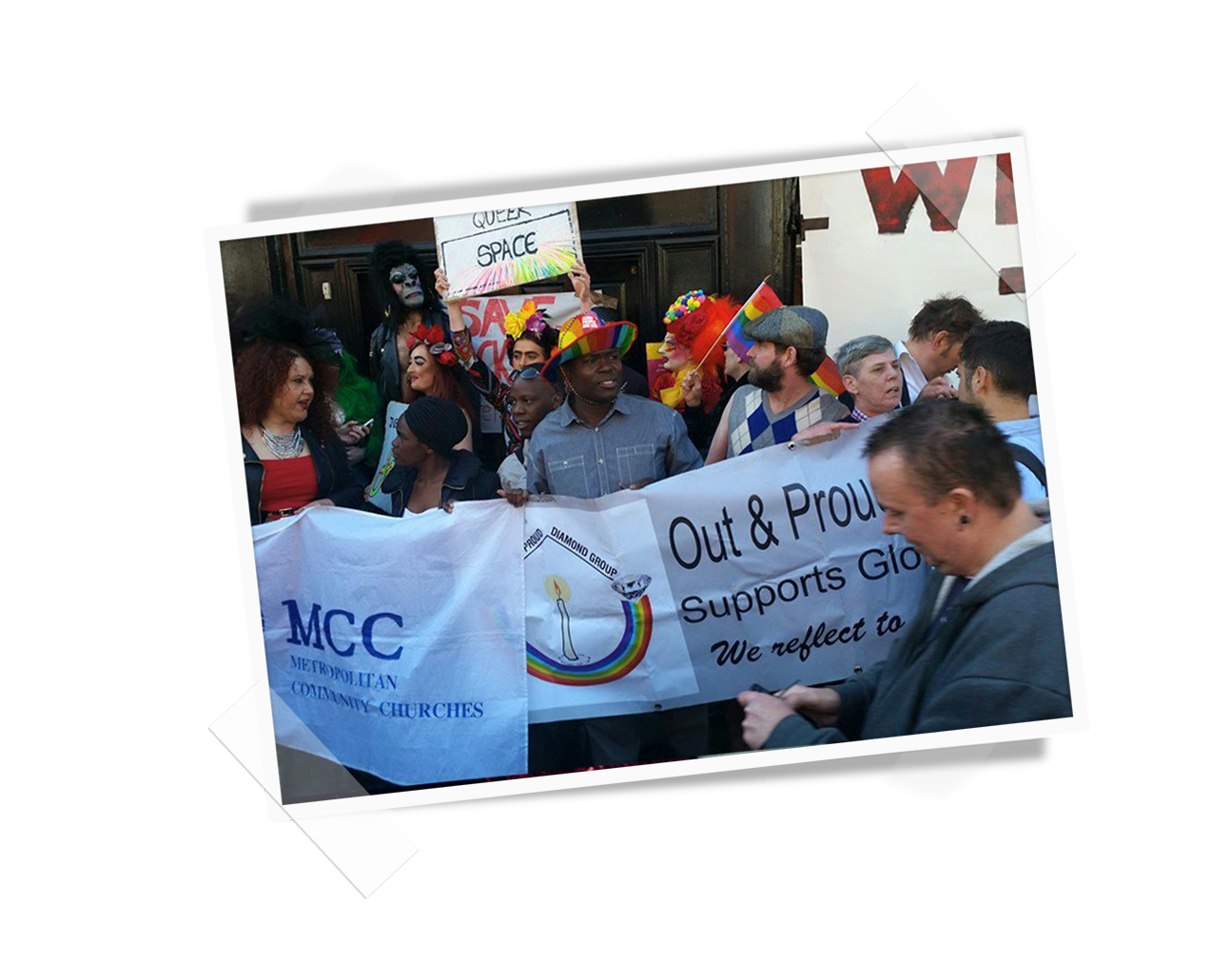
Members of the Metropolitan Community Church protesting against the Black Cap’s closure in 2015
Reubs Walsh
Scientist and commentator Reubs Walsh remembers the Black Cap as ‘the only LGBT venue where I as a Christian autistic genderqueer trans woman feel completely safe‘
At the same time, the Cap has always remained an explicitly LGBTQ+ space and a place of support and safety for the most marginalised parts of that community including trans and gender non-conforming people, gay and bisexual women, and queer and trans people of colour and disabled people. At a time when many London gay venues were overwhelmingly male, white, and cis, the Black Cap always held space for women, people of colour, and trans people. It was also unusual in having a wide age range, bringing older and younger LGBTQ+ together. One regular from the 1980s and ’90s, Jill, told QX magazine: ‘I came here as a 20-year-old in the eighties and there were older gay people here, queer people, that gave me a sense of history and that I belong somewhere to a culture.‘
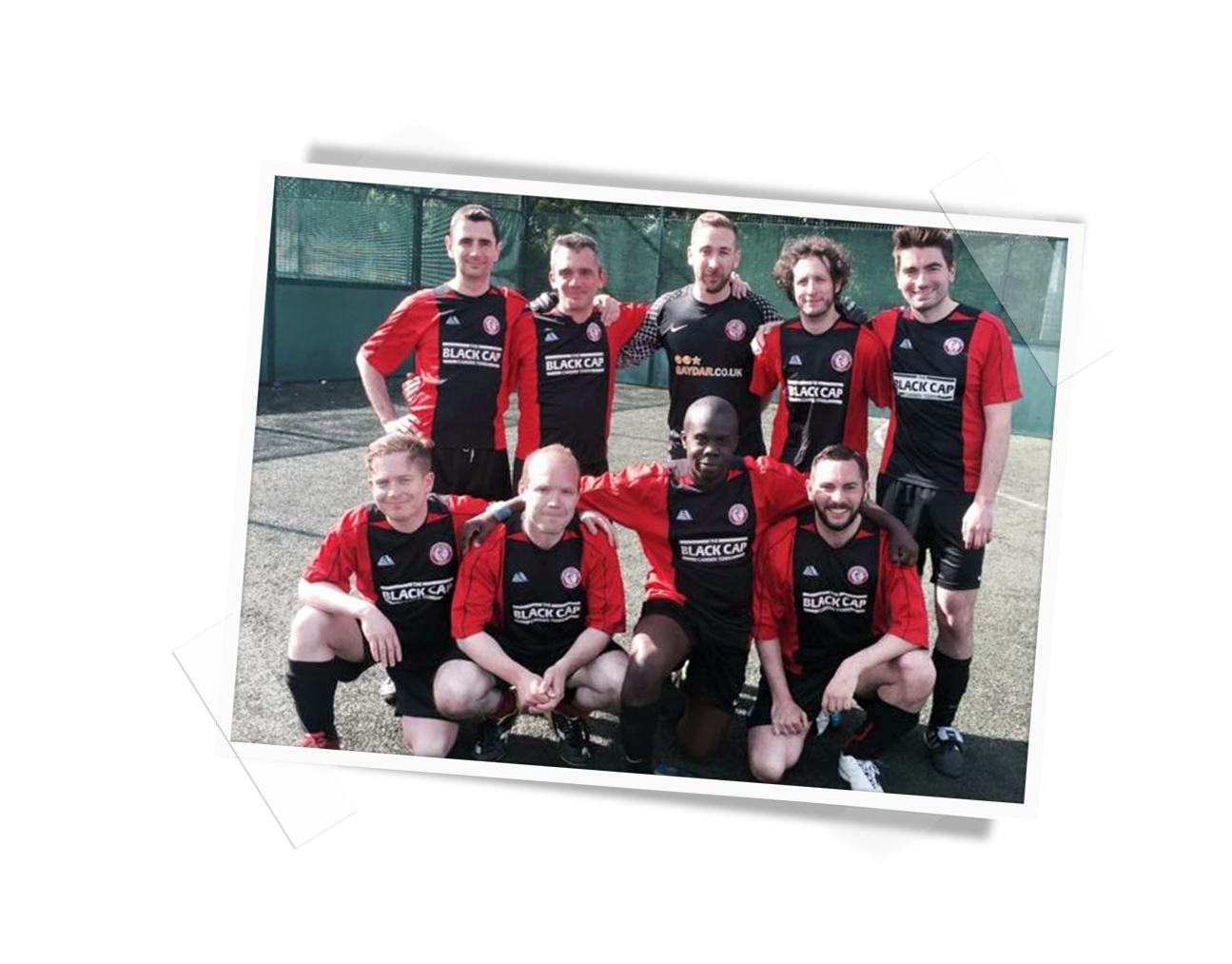
The Leftfooters, founded at the Black Cap in 1999, here wearing their Cap-sponsored kit
This diverse and friendly atmosphere made the Black Cap a core part of London’s wider LGBTQ+ culture, and the Cap fostered many community and activist groups. It served as a second home to the Camden LGBT Forum (now named forum+) and played a crucial role in the Forum’s growth to become one of the foremost organisations of the its kind and the organiser of the UK’s biggest LGBT History Month celebrations year after year. Other groups frequently hosted by the Black Cap include: the Metropolitan Community Church, one of the country’s most diverse faith organisations, many of whose north London congregations are LGBTQ+ refugees and asylum-seekers from Uganda and other central African countries; FTM London, one of London’s oldest transgender support groups; London’s LGBTQ+ recreational football team the Leftfooters, and informal football group London Lesbian Kickabouts; Opening Doors London, the UK’s largest support charity for older LGBTQ+ people; and wind orchestra London Gay Symphonic Winds. Many of these groups might never have flourished without the safe and nurturing environment of the
Black Cap.
Sudden closure
Back to buttonsFrom around 2012 the owners of the Black Cap, a company called Faucet Inn, began to make planning applications to make changes to the building. Faucet Inn had bought up a number of London pubs in around 2010 and had already converted the upper floors of some of them into luxury flats – a type of change notorious for leading to the closure of the pub below. Worried by this trend, friends of the Cap successfully applied for the building to be designated an Asset of Community Value (ACV), preventing the owners from selling or leasing the building without first giving community groups the chance to make an offer.
Faucet Inn appealed against the ACV decision and had it overturned on a technicality. At the same time, they applied for permission to turn the upper floors into flats just as the campaigners had feared. But the community opposed the change. In February 2015 Camden Council refused the planning application and on Wednesday 8 April the Council also reinstated the ACV designation.
Four days later, 12 April, was Easter Sunday and a special cabaret show hosted by Virgin Xtravaganzah. During the show an announcement was made: Faucet Inn was permanently closing the Black Cap at the end of the night. The owners had told a small number of staff and performers on the Friday but had ordered them to keep it secret, threatening to stop them getting work at other venues in future if they told anybody.
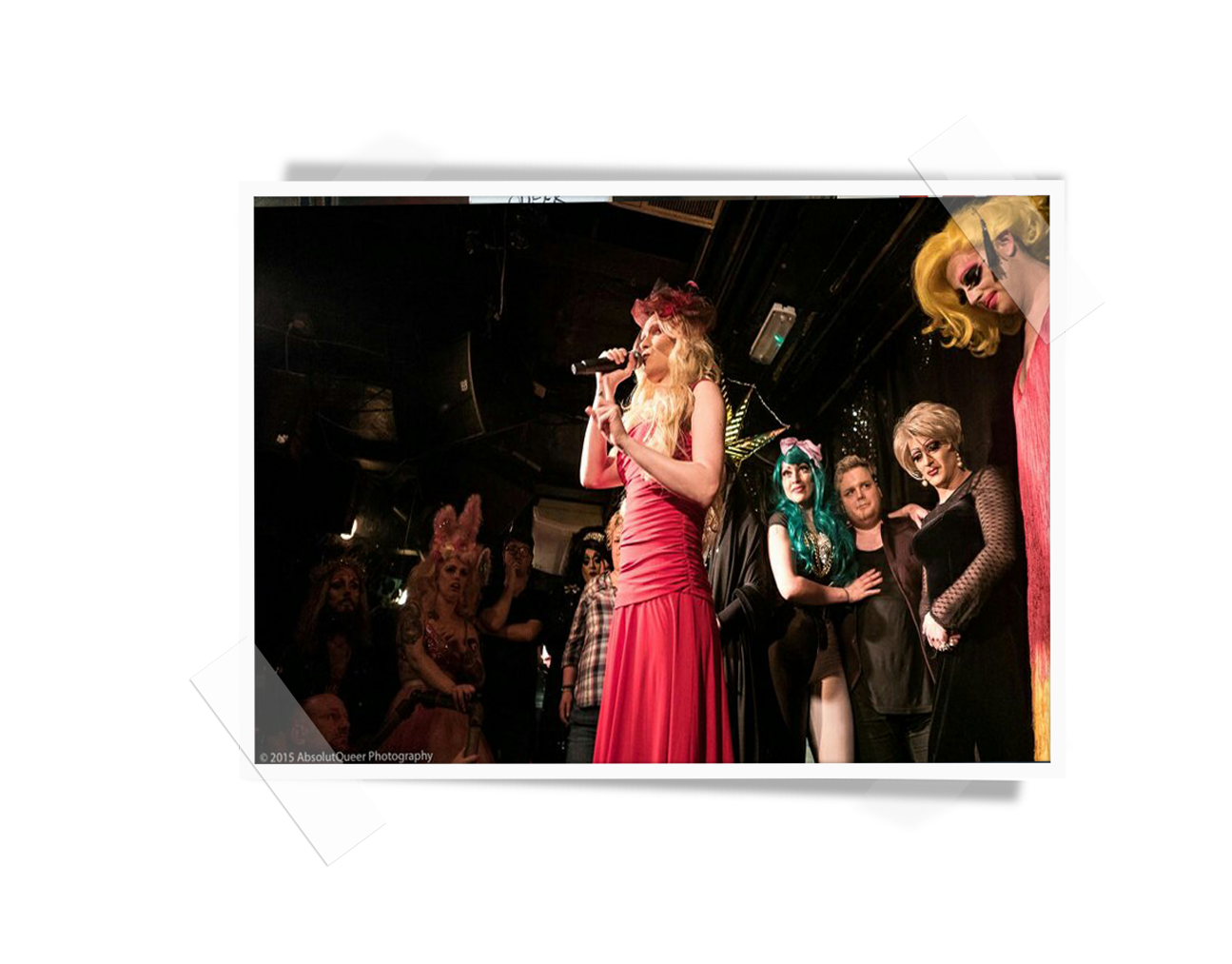
12 April 2015, the last show before the Black Cap was closed
Customers, performers, and staff gave the Black Cap an emotional farewell, making speeches from the stage, joining a chorus of Say hello, wave goodbye, writing messages on the changing room mirrors, and dancing on the bar to Like a Prayer.
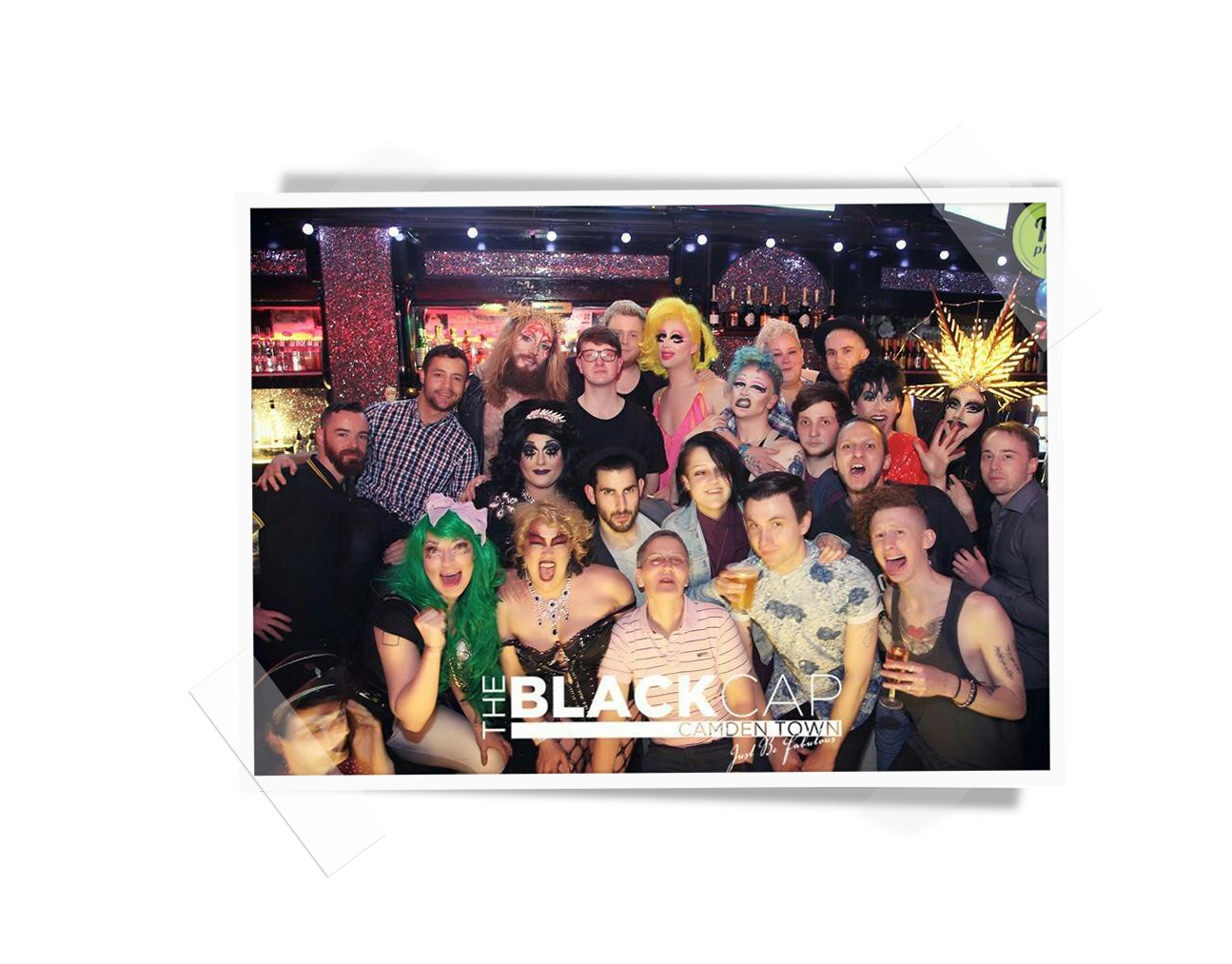
News of the closure was broken in the media the next day by This Is Cabaret and the Not Television blog, and was quickly picked up in many other places including the Evening Standard, the Camden New Journal, Pink News, the Independent, Buzzfeed News, and the Kentish Towner. Meanwhile, the campaign was beginning…
Personal memories
Back to buttonsIt’s sad, you know, it was a place of entertainment for years, and it’s not as if there aren’t enough luxury flats going up around London. So they take a perfectly good boozer and turn it into flats. Well, I hope whoever moves in there is haunted by the ghosts of all the old Drag Queens who used to perform there. So if you wake up in the night and you find Mrs Shufflewick, Marc Fleming, Phil Starr and Regina Fong at the bottom of your bed serves you right. That’s all I’m saying.
— Paul O’Grady (Lily Savage)
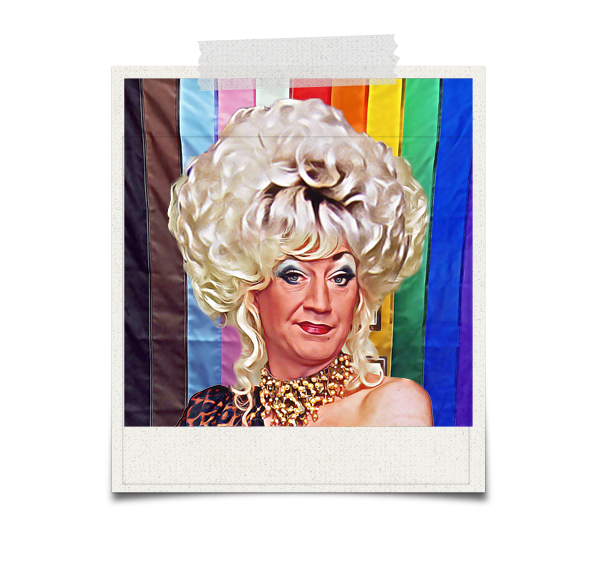

“Here’s a little history behind the Black Cap we know & love – it was originally called The Mother BlackCap after a local legend concerning a witch and had that name, according to licensing records, as early as 1751. In the winter of 1965/66 it became known as a safe place for gay people. Eventually becoming the iconic Black Cap as it is known today. Until April 215, when closed without notice, the Black Cap continued to be a safe place having launched many a career – Lily Savage, Barry Cryer, Bob Monkhouse, Rodd Hudd amongst other famous faces were often seen thereon Sundays. This architecturally fabulous safe venue is part of the colorful melting pot of people that make Camden Town such a wonderful, funky place. People come to Camden from all over the world. Please reinstate the Black Cap – Camden just isn’t the same without it.“
Elizabeth Jameson

The Black Cap was the social venue for Metropolitan Community Church North London (MCCNL). MCC is an LGBT-majority denomination birthed from the LGBT community in the context of the US gay civil rights movement. It was our weekly post-Sunday service home for socialising. The Black Cap also hosted our Wednesday mid-week group for a time from September 2013 and once the group became too big to host around a couple of tables in the Shuffle wick Bar and we had to move to the church building on Buck Street, we’d ensure we would schedule regular socials there. It was the go-to meeting place for the clergy and deacon team to have meetings or conduct mentoring or pastoral care sessions. The Black Cap has also hosted ‘Beer & Hymns’ for Christians Together at Pride during Pride Week.
I cannot overstate the huge loss the Black Cap closure represents to our church community. We are a church of 100+ and half of us are LGBTQI people seeking asylum from persecution due to sexuality and gender identity. The Black Cap had been the first safe queer space many of our asylum-seeking people had experienced; both the first-floor bar and the club on the ground floor. This was also true of some of our younger people coming to our church from conservative Christian churches and families who were taking their first steps in coming out and connecting with other LGBTQI people. I echo Alex’s point that the Black Cap felt like a ‘home’ and ‘family’. Personally, if I was early for a meeting elsewhere I could always go to the Cap and I felt safe and welcomed. There was always someone to talk to whether they be staff or fellow customers and I’ve made some genuine friends from serendipitous meetings in the Cap.
The Black Cap has unique value as a community resource for the North London LGBTQI community. We as a faith group are struggling to find alternative venues in which to meet that provide the safety and welcome our people need and benefit from.
I’d like to add that I think the Black Cap is unique in that the community wasn’t compartmentalised; ‘men’, ‘women’… etc… We all mixed together in one venue and were richer for it and it was somewhere where we could bring our straight friends and family too (my 80-something-year-old mother loved coming for a G&T).
‘Family’. ‘Home’. ‘Unique’. ‘Valuable’. ‘Irreplaceable’. North London needs the Cap“
Katrina Cheong

“Well one thing I know is that the upstairs was used weekly as a after service chill space for the local all affirming Unitarian church. I know may Camden LGBT groups that met there weekly as well. Just to add those groups no longer have a local safe place to go where all members feel safe in Camden“
Octavian Starr

“The black cap was used as an initial meeting place for Leftfooters FC (http://www.leftfooters.co.uk). We were founded there in November 1999. This was our main base to meet people and drink and socialise as a group after kick a bout on a Sunday. When we played matches with other teams we would go back there to socialise and there was gay, lesbian, bisexual, transgendered players from all over the UK. The venue supported us for years (especially under Jimmy) and we also used the downstairs for fund raisers not just for ourselves but also charities such as GMFA and The Food Chain. The Gay Football Supporters Network also used the Black Cap for get together and committee meetings for years. We were not the only sports team that were supported and used the venue consistently. There was also London Lesbian Kick a Bout who liked us stored our football equipment at the cap. I don’t know what the legal definition of a Asset of Community Value is but I know the Black Cap was one for us and lots of groups.”
Oliver Daly

“For a period of time, the black cap provided free rehearsal space for musical ensemble London Gay Symphonic Winds, at a time when finding a consistently available and affordable rehearsal space for a community band in London was proving very hard. This certainly helped maintain the viability of this group during its formative period, and has helped ensure its strong position now. Black Cap is very definitely a community asset for the gay community.“
Tom Briers

“When I came to London in the 1980s from Leeds the Black Cap became a safe haven; somewhere I felt safe to be gay. Over many years I was entertained and found a family of friends. Just like all families (even when we were no longer all local) we had our ‘place”; the Black Cap played host to hundreds of birthdays, Christmases. New Years, funerals and more recently wedding celebrations.
When I have been on the demos and Saturday pickets the story above of Black Cap being a ‘family space’ is repeated by so many people. Without the Black Cap we’ve lost an important central heart in the community, gay and otherwise.“
Alex Green

“In an area like Camden, which can sometimes seem quite rough and intimidating for a gay, the cap was always a place to go and feel welcome. You could be whoever you wanted to be and there was no judgement passed.“
David Ludapo

“We are a married couple I ( Louise ) am a tranny and always have been. Where is there for us to go now that the Cap has closed? We were regulars and were always made very welcome. No one ever stared (except with admiration). The staff were fantastic and always remembered our drinks. Other customers were amazing and would always say hello. We could go there during the day or at night. The Cap was a safe haven for us. The one place we could truly feel comfortable without threat of violence or ridicule. PM for contact details if needed.“
Louise n Karen xxx

“It’s about remaining visible and demonstrating that the Cap was more than just a bar and club, it was a home and community hub for many people. Its place in the annals of drag and queer history is unquestionable and its loss to the regular community who attend the venue both day and night will be profound.
The Black Cap has been a gay venue for more than fifty years before it was even legal to be gay in the UK. But it’s also played a huge part in the history of drag in this country, with people like Mrs Shufflewick and Regina Fong having had residencies here.
We still need these spaces, it’s all very well that we can get married, work for a bank or join the police – we can be our own oppressors now! But spaces like The Black Cap allow people to invest in being queer, lesbian, gay, trans or straight in a way that sits outside of that logic.“
Joe Parslow

“We’re not gonna let the Black Cap go down without a fight“
Amy

“Because it’s not just an isolated incident – it’s a decimation of queer spaces in London. Aside from the uniquely glittery heritage of The Black Cap – decades of drag icons, from Regina Fong and Lily Savage to, latterly, Bianca Del Rio, have performed there – its presence today is, was, keenly felt.
We have a lot of vulnerable people who come to our group – young people who’ve been abused by their churches, LGBT asylum-seekers – and every Sunday we take them to The Black Cap. It offers a safe space, a new feeling of understanding, for people who’ve had a really horrible time. It’s not just a building; it’s a community.“
Kate Woodrow-Cheong

“I used to go there in the 70s. It was fab and a fantastic part of the real London. It can’t close.“
Floss Kroll

“I celebrated my birthday there the Saturday night before it closed on the Sunday! I spent at least one night a month there for last 4 years….“
John McKain

“Yes, we know that The Black Cap did go through a bad patch, when it was sold to faucet inns she was in decline, over five years, five managers with hopes and promise came and went, support withdrawn for ‘The Drama Queens’, we lost our home and then during the last 18 months thanks to Benjamin Giddins, The Meth Lab and the fantastic The Familyyy Fierce, the place was once again packed to capacity, this surge of excitement, along with the development of artistic creativity was also ‘crushed’, stopped purely for the profit to be gained by conversions into flats and a retail outlet!
I have no problem with any failed pub that’s been boarded up and left unwanted being changed into something that will boost the surrounding area, to help the housing shortage, but I do take it personally and will make a noise when they go out of their way to deliberately drive a business into the ground, forcing out a community, ‘spiting’ on its 50-year history; crushing developing creativity and for closing a performance space, just to turn a World famous LGBTQ Venue, The Palladium of Drag into flats for purely financial gain, with no concern for the damage they leave in their wake!
I believe, If we just sit back and let them do this, we’ve learnt nothing from Stonewall Inn, no, I’m not calling for a ‘riot’, as I believe we have right on our side, I believe, we do have a legitimate case to be considered and I believe, we should NOT just give up and let her go, because if we do, it easier for others venues to follow!
I believe, If we can’t see how important our LGBTQ venues are if we don’t decide to stand up and fight for our right to have such safe places, used for years and known as ‘queer’, if we don’t see any value in the history of the growth and the development of our community, wherefrom stages, by Drag Queens, we were encouraged to join a demo, told march its alright to be who we are!
If we see no value, then I believe, I’m sorry, we’re ‘pissing’ on all the activism that grew from such venues, that lit a match that became a spark and grew into a flame that lit the path to the equality we have achieved so far!
I believe, for the equality we have today, we have to make a stand, we owe it to our past, as the present community and we need to save it for our future LGBTQI generation!“
Spike Rhodes

“The Black Cap was my first ever gay venue and will always be a bit special! Had so many good times there over the years. Would be good to see the old girl up n running again x“
Tina Rybell

“I fucking love Camden and I miss the old times at the Black Cap. It’s a special place for me cause it was the first pub I’ve been in my very first night in London 4 years ago.“
Eva Molks

“We met in Saudi Arabia and so we treasured being able to show mutual affection and feel comfortable in the bosom of the Black Cap. We would love to have our reception there when we tie the knot.“
Joyce McLean

“The Black Cap which for over fifty years was a thriving centre for ‘homosexual’ entertainment was a unique venue for the LGBTQI community on so many levels.
Unique in its history and the most significant of its genre of ‘queer’ entertainment not only in London but also the UK.
The loss of our beloved venue has now left a HUGE void in our community.
This venue started the careers of so many ‘icons’ of our community who appealed to customers of all sexualities and identity. Lilly Savage aka Paul O’Grady is just one example.
This venue could not be regarded as just another pub, if this was the reality it would not have been known as The “Palladium of drag” or attracted Hinge and Bracket, Tony Page, Mrs Shufflewick, Arthur Lucan, Old Mother Riley, George Logan, Patrick Fyffe, Regina Fong, Adrela, Lily Savage, The Meth Lab, Familyyy Fierce, many stars from RuPauls’s Drag Race and many more over the years. Just another pub?
Some venues identified with OUR community over the years have closed for logical economic or social reasons, not The Black Cap. For eighteen months until the sudden closure in April 2015 the venue was packed, no money had been spent on the venue for many years, so the owners were making good income.
The distress caused to my community after the closure I have never experienced on such a scale. For so many this venue was a life changing experience and so lived up to the words of Harvey Milk one of our most significant international campaigners: ‘All young people, regardless of sexual orientation or identity, deserve a safe and supportive environment in which to achieve their full potential.’
I passionately hope that this venue will be returned to OUR community in the Harvey Milk spirit of ‘Unity Through Diversity.’ “
Michael Peacock

“The Black Cap was the first gay bar I ever went into. When I first moved to London I was 22 and still in the closet. I used to come to Camden with my straight friends and see the Cap on Camden high street. It took months to get enough courage to go there and one night I left my friends early and went to the Cap on my own. I still remember the night and it felt like coming home. It gave a lonely, fresh face boy from Wales a place to go and meet other people the same as him and I’ve been going there now for over 23 years. One of the things I loved about the cap it was gay venue that is very visible, its always looked very proud sitting there on Camden high street for all to see, so many gay venues are out the way and hidden. It’s a bit of a gem and its worth saving. “
Mark Croft

“When I moved to London, it was one of my first times in a big city and I’d never really explored gay life. I was living on Parkway so once I discovered the Black Cap, for about 3 years I was there nearly every night.
New found confidence with my sexuality, I went on to work at G-A-Y, Heaven, Fire, Hidden, The Den, Ghetto and get involved with lots of other aspects of the LGBT community that weren’t nightclub based. I often wonder if I would have ever got so involved in community work if it wasn’t for those formative years of having a local pub that I could call home.“
Zack Polanski

“I wish I could be there to show my support, I hope you retain the status and Kicking Horse appreciate that you cannot simply wipe out Gay history for profit. Best of luck and I hope to hear positive news in the near future. I’ve been on holiday over the past few weeks so not kept up to date with developments on here but please let us know if there is anything the community can do to help. I live in Brighton now but the Black Cap was a fundamental part of my coming out and I was extremely sad to see it close.“
Jackie Lees-Howes

“I first went to the Black in 1998 as a curious lesbian who as a black female from a religious family was unable to express my sexuality, I found the black cap amazing as I met so many people in my position who where struggling with there ethnicity and gender as well as thir true feelings for men and women alike.
I felt at home for the first time in my life accepted and throughout the I’ve met the most courageous and influential people from policemen, lawyers,teachers, even preachers, transgender, transexuals, A sexuals, Drag Queens and kings who some,(not all) have been hiding behind the strict straight life, the monotone mundane life and inside their screaming to be their selves, free from hate and free from negatively.
I continued to struggle with my race and my family values and beliefs which I believe made me uncomfortable in my own skin not knowing how to think feel or believe for many year, But the the Black Cap for me is somewhere where all demoninations, creeds, colour and ethnicities can go and feel they have somewhere, somewhere we belong a home from home, a safe environment for those who have left their countries to express themselves and experience freedom.
17 years later I met my beautiful fiancé there and I’m so proud of the progress my life and others have made.
I NO LONGER FEAR REJECTION I NO LONGER CARE WHAT PEOPLE THINK AND THE BLACK CAP HAS HAD A LOT TO DO WITH IT!!!!
I’ve made friends for life in the Black Cap I’ve worked there briefly and enjoyed every minute meeting different walks of life amazed by how many tourist come from all over the world to watch the shows and with amazing reviews and the locals and regular customers who have been going for 50 years when it was much harder then to be gay!! Listening to the stories of our struggles to have a voice it’s heart wrenching this is not only a place where people come to watch show and have a good time, we go there to learn more about our history and how we struggled as the gay people its a pinical place for all straight or gay and has been part of the community for many years I believe Camden as a whole will be lost without it!
Please let us keep our home.“
Dayna-Marie Joseph

“I might have not been a performer, drag queen or bar staff at The Black Cap and probably no one remembers my face either.. But I don’t care, I feel amazingly proud to have worked for a fantastic establishment like this one!
Thanks to all the people that have helped me (nails permitting Joey A. Frenette-Wood) at the door and who trusted me to be the face of their night. You were the reason why I was going at work with a big smile in the face!! Now let’s go to get back what we want! “
Giovanni Giordano

“Besides the Drag career which arose from watching all the wonderful varied performers that graced that stage in the years before, my longest and closest friends were met in there.
The majority of my best memories arose within that building and my whole adult life was spent growing up in there; from the late eighties when we were still overshadowed with the AIDS crisis to our more liberated times.
The Black Cap had a new group of performers in there over the last year or so and I thought they were doing well. I never really thought I would be back there as a regular performer. But its closure affects me more on a personal level. Once again our heritage and culture has been steamrollered over in the name of greed.
It is such a sad and infuriating situation that we have to be standing out here on a Saturday afternoon when just over a week ago we had no idea that this travesty was going to happen.
The saddest thing as well is that they had people in the gay scene telling each other “Well if you don’t use it, you’ll lose it.” But the truth is, it was being used. Since the last government came in, 15 gay pubs have closed in London. This cannot happen again. This is not the Black Cap’s funeral. The fight must go on.“
Titti La Camp

“Camden LGBT Forum has a long history with the Black Cap. It was one of our original safe havens for LGBT people, and has been host to dozens of Forum events and outreach sessions and I fondly remember our trip there to celebrate the founding of our Forum 13 years ago.“
Nigel Harris

“If it wasn’t for this place, for The Meth Lab and the Familyyy Fierce [drag collective], I would still be closeted and hating myself. I love this place.
I don’t want to walk into a bar and be touched up, or for men to make assumptions of me. I want to have fun, and this was a wonderful creative space I felt safe in.“
Lexie

“I started coming here when I was 15, when all this still had to be behind closed doors, I was brought up here, growing up it was the best place in the world, People still get attacked, get battered, hear homophobic remarks, wherever you are. I’m 52, but when I walk down the street my neighbours still say to each other, ‘oh, that’s the fucking lesbian, don’t talk to her.’ Honestly“
Mel Howes

“The Black Cap was the first gay bar I stepped foot in, when I rocked up in London 23 years ago. Up until last weekend, I used it as a place to work with the community in Camden, as the Chair of the LGBT forum there. We all know that transgendered crime, right here in Camden, is at an all time high, but this place was a safe haven.
This is the cathedral of the drag queens, and we must never forget that the drag queens are the genesis of our freedom. Without them we would not be here, but today they’ve lost their sanctuary. The people who entertained us, who enabled us to feel good about ourselves. It’s a labour of love. This place isn’t just a space for us, it encapsulates a spirit.“
Father Bernard Lynch

“Every time my sister came to London we’d go to the Black cap for a pint in the terrace. Lovely pub can’t let it disappear in a wave of gentrification.
Eldredd Chester

“The Black Cap was my introduction to the gay scene as a 15 year old girl I went often with my Hairdresser Butch and watched in amazement as he transformed into Diana Ross in the tiny dressing room at the back, then we would head to Bolts to finish the night. I did all my fag hag training here and it holds a very special place in my heart.
Julie Fox

“If there is any justice in the world, clearly we don’t want this gone. Its earned it right to stay!!!! Save the black cap.
Harrison Skuse

“This is so important! I feel so passionately about this and deeply saddened by the current fate of not only an iconic, historically important venue but a place of safety for many and a place where I personally have made many a true friend.’
We can’t allow such valuable institutions to disappear like dominoes..
Dusty Springs

“It was the kind of building that remembered things, deep-down things, things that rode tears into the world, telling them back to anyone old enough or wise enough to know how to listen with their eyes.” X
Craig-er Bell

“While it wasn’t a community centre, there were groups within the LGBT community that depended on it and met there regularly. I saw gay footballer groups, MMC church group, Opening Doors, etc. These groups need a local LGBT-friendly space to let their hair down. It also created a loyal community of its own of staff, performers and punters;
we ARE a community.”
Rob Eagle Patrick

“I first started going to the Black Cap when I moved to Camden ten years ago. I was from Manchester and when I visited Soho, I felt like everyone knew their place. The Black Cap was defined largely by the fact you lived in north London. As a result, I was befriending lots of characters older and younger than me that I might not otherwise have come into
regular contact.”
Zack Polanski

“I went to the Black Cap a few years back and I have to say it was one of the most humble venues I had been to, and I felt welcome there, let’s not let this legend of a pub die especially over 50 years of history with all the acts that have
performed there!!.”
Adam Lewis

“The Black Cap was a vital meeting point for the congregation, around half of whom come from Uganda, where homophobia is rife and homosexuality illegal… He said: “This place means a lot to us because we all come from countries where it’s very difficult to be gay. This is a safe place, where we can socialise and interact with other people, while we are still healing.”
Edwin Sesange

“The LGBT and drag scenes are the canary in the coalmine.”
“For various reasons, not least our society’s structural homophobia, the gay community tends not to actually own many of the spaces it uses, so it is relatively easily dispossessed of them. At first, it’s those without much clout – the gay scene, the cabaret scene, the independent music scene – who get clobbered, then the slightly less marginalised, and so on.
We have to be proactive and take responsibility. We have to use the few imperfect legal instruments available to us, such as assets of community value status, to protect places that mean something to local communities. We need to make our losses visible through outreach work and protest – at the venues themselves and the offices of those killing them.
But beyond that, we as a society have to recognise that some things are worth more than money. It was, quite simply, the only place where some people felt at home. Now that home has gone..”
Ben Walters

“I’ve only been going to the cap for the past 12-18 months really but it’s become a place I love and always feel safe and welcome. Whether we are able to save this iconic venue or not, we need to make our voices heard before any more of queer London disappears. We all need to do our part. That means visiting your local venues and spending money. I hope the doors of the Cap open again and I see some of you there in the near future.”
David Ludapo

“It’s very sad. I’ve been coming here since 1977. I’ve worked here, lived here, performed here.
It can’t be replaced, it won’t be replaced..”
Jimmy Trendy

“It’s become a sort-of community place for a lot of us, whether we’re gay, lesbian or queer. I started coming here a few years ago when I came to know my own queer identity.
I never felt uncomfortable, or like an outsider or how I feel in a lot of gay-oriented spaces. .”
Sarah Moore

“We’re not just being pushed out of Soho anymore. We’re being pushed out of London. Camden?
It’s the heart of alternative London.”
Debbie Davis

“Our history is being erased from the streets of London. This is because of a property boom. It’s not like they’re shutting down decrepit places no one wants to go to and turning them into flats. The RVT and The Black Cap are thriving businesses. At what cost do we allow this to happen? Ours is a history that’s not in the history books.
It really is about greed and a complete disregard for our history and community in the name of ‘progress’, which really equals rampant capitalism. What happened with The Black Cap is disgusting. It feels like ideological warfare.”
Amy Lamé

“Well I mentioned the suggestions of a protest and a petition a little while ago, and here we are, what amazing support so far, I went to the Black Cap a few years back and I have to say it was one of the most humble venues I had been to, and I felt welcome there, let’s not let this legend of a pub die especially over 50 years of history with all the acts that have
performed there!!
Someone told me that London is dying and they were right to a certain degree, but it’s not just dying, it’s being murdered.”
Adam Lewis

“That is family right there for me. When I was there, it was my home away from home and we had a beautiful holiday celebration there. So many fierce English and Scottish girls are there, and drag is just blooming in the UK, so we have to save somewhere that lets the girls perform. .”
Latrice Royale & Morgan McMichaels

“I arrived in London with 25 pounds in my pocket. I’ve lived in Camden for 17 years and had my first drink in The Black Cap. Camden does not need another frikkin’ gastropub. Camden believe me has plenty. What it needs is a queer space for us, the beautiful people.”
Tina Hibbins

“All I can say is that “those who forget the past, are doomed to repeat it. Yes, things have changed since I first came on the scene, as at that time in London there were over thirty venues for Gay people, now owing to the decimation of a generation of Gay people through AIDS, the Internet and the fact that str8 breweries have squeezed the pink pound, our venues and heritage is being destroyed.
We need gay venues for both young and old not just gay friendly, as there are times when being in an all-gay space is safe and all-encompassing.
I remember when I first came onto the scene, I joined a gay befriending group. Once a week we would meet at the home of a befriender, where after tea, coffee and introductions we would then go to a gay pub ( in my case it was the Black Cap) and then onto a small club. It was a safe introduction and we built up our friends through those links to be able to branch out onto the scene without fear and know we could find somewhere we could be ourselves.
Loss of our venues will make it harder for those coming up and out.”
Ebbonknee Zealy

“A lot of these people helped fight for acceptance and to change the law to make it safer for all of us to be who we want to be. These people need “safe” spaces as they have been through the toughest time and we owe it to them to do what we can to help them stay in the community and to be safe. We need our spaces to remain safe and welcoming to all. Not to lose them to greedy developers!”
John McKain

“Gay bars are still needed for younger people. My wife is 40 and is a butch lesbian. In straight bars, she gets looked at and even told she’s in the wrong toilet. She and I want to be somewhere she feels comfortable. Add to that straight bars are hetero normative places and in a world full of straight stuff sometimes you just want a bit of gay!”
Jo Holloway-Green

“There is a specific issue within the queer community, that certain segments aren’t as recognised by the capitalist society; it’s not as lucrative to be a lesbian, it’s not as lucrative to be trans or queer.!”
Heather Doon

“This place is important to people like me, people met their first lovers here or came out when it was so difficult. But there’s a wider issue, pubs are being developed and luxury apartments are popping up, communities, not just ours, are being eroded.”
Richard Rock

“This was a world-class drag performance venue, it’s not limited to the gay community. It’s a queer idea for anyone, whatever their sexuality – a place for artistic experimentation, and it’s a travesty to have that taken away.”
Jacob

“In The Black Cap I didn’t just feel safe, I felt invincible, I felt absolutely untouchable. It was my home and everyone who worked there was family, no voids between bar staff or management or performers, we were all in it together and that means such a gigantic amount to a lot of people and it’s gold dust; so hard to find and so precious. A Queer agenda that had been put in place and truly respected has been snatched away from us to be shoved into misogynistic venues who do not appreciate the early arrival of the future of drag.
Hearing so many stories as to why people were so devastated was almost too much to bear, from stories of people feeling their most comfortable and finding safety under our roof to historic tales of people’s relatives who used to come to The Cap when they were our age and how devastated they are going to be when they find out. You truly run out of things to say and it reaches a point where all you can do is hold someone.
Unfortunately, the cause of gentrification doesn’t care about the community. Money grabbing, greedy schemers couldn’t give a royal fuck about how people feel about a venue. These buildings are just skeletons that they feel like they can gut and restore with high street bullshit. These people have no idea that there are souls in there, there’s a pulse and a heartbeat.
Behold the story of how my home was ripped out from underneath me. From underneath us. .”
Ruby Wednesday

“I honestly believe that all forms of Drag and performance were always welcome in The Black Cap and The Meth Lab allowed a whole new audience to experience the Black Cap in all her glory. This night was a major factor in keeping the Cap going longer and there was an amazing integration of styles in this show. I saw Myra support during a Meth Lab show for example. We all need to come together under one banner to fight this fight and we need to appreciate that no matter what the generation they are all performers and are all artists and while it might not be our cup of tea what a particular act does we should respect their right to express their art form. After all, that is exactly what the Black Cap has always stood for, a safe space for LGBTQ people to express themselves.”
Steve Binks

Black Cap Community
Campaigning for Camden’s LGBTQ+ history and future.
A community benefit society regulated by the FCA, number 8525
Get in touch
Follow us
Facebook Group
Facebook Page
X
